Moved Permanently
The document has moved here.
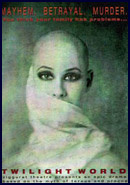
The Ziggurat Theatre Ensemble is a visionary troupe of performers who borrow from the rich traditions of folklore and world myth and then transform these venerable stories into extraordinary stage events. Ziggurat, as its mission statement states, seeks to unite the diverse cultures of its home city, Los Angles, by "illuminating themes from world mythology, which transcend cultural boundaries by addressing our common experience." And what dazzling and astonishing experiences these are! The beauty of language and song is combined with a visual feast: glorious costumes and masks, movement and dance and martial arts fight scenes that rival the wire work of the Hong King cinema. While the tales may be ancient, the emotions they evoke in the hearts of contemporary audiences are timeless.
Each one of Ziggurat's productions inspires audiences, drawing them into the ritual of performance, weaving together the contemporary with the ancient, collective voices from diverse cultures, and an astonishing array of visual arts. In the award wining Red Thread, the hero, an assassin newly converted to Buddhism, struggles to understand an unfamiliar morality as she considers how to wage her battle against evil without resorting to murder. In the adaptation of Daniel Defoe's Journal of the Plague Year, set in London during the Plague of 1665, a saddler becomes a witness to the best and worst of human nature as the population of London descends into a mire of disease and death, and ultimately finds a measure of hope. Chomolungma, based on the tragic Everest disaster of May 1996, examines our ancient and current fascination with the spiritual power of mountains.
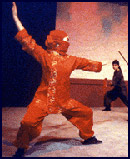
The driving force behind Ziggurat's innovative productions is artistic director Stephen Legawiec, who one reviewer described as a "multi–tasker with a vengeance," writing the plays, designing sets, directing the productions, and, oh yes, acting in them as well. He has composed over a dozen theatrical scores including Caucasian Chalk Circle and The Snow Queen. He is the author of 26 full–length plays, including Ziggurat's award–winning Aquitania and Red Thread and most recently, the acclaimed Salamanticus. A rigorous scholar of folklore and mythic literature, Legawiec has researched myth and world theatre in Europe, Asia, and Africa. He is a member of the International School of Theatre Anthropology, a multicultural network of performers and scholars interested in Theatre Anthropology.
In 1990 and 1991, Legawiec spent several months in Poland, observing the production process of the Krakow–based Teatr Stary. Inspired by Jerzy Gorotowski's Towards A Poor Theatre, he developed an interest in forming a troupe of actors and artists motivated by the ritual power of myth, and committed to a lengthy, investigative rehearsal schedule — a rarity in American theatres, which generally settle for much shorter production schedules. The Ziggurat Theatre was founded in Los Angeles in 1996 and its mission is two–fold: to create performances inspired by world myths, and to support a group of resident actors committed to growing as artists.
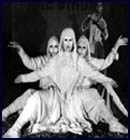
Recently, I was very fortunate to have the opportunity to interview Stephen Legawiec through an exchange of emails. I wanted to understand the developmental process of a Ziggurat production from the selection of a piece and the creation of the script to the unique rehearsal process of this remarkable troupe of performers and artists. Stephen's responses were insightful, thoughtful, and utterly fascinating. It is a great pleasure to share them with you now.
The Stephen Legawiec Interview
Looking over the variety of cultures represented in Ziggurat's repertoire, I am curious as to how a particular story finds it way to you? Certainly there is a long distance between Defoe's Journal of a Plague Year (not something one casually picks up to read) and the Chinese heroine tale of Red Thread. While there is a universal quality in the mythic narrative of the pieces, they are also particular moments of storytelling. So how do you choose a piece?
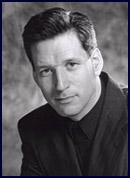
There is a famous saying that almost all writers have only one story to tell and they keep telling it. I have discovered that virtually all of my stories are about spiritual transformation. I say "discovered" because I write by instinct. I don't sit down and say I'm going to write a play about spiritual transformation. I write about a subject that interests me and when I'm done I sit back and realize, "Oh! This is about spiritual transformation again, isn't it?" So the way the Saddler's spirit changes in Journal of the Plague Year as a result of the plague and the way Hongxian's spirit changes in Red Thread as a result of her Buddhist indoctrination can, at their most elemental level, be read as the same story.
That said, there are certain themes that continually interest me and are incorporated into these stories. I find myself drawn to the themes of Time, the Past, the Identity, Dreams and Suffering, for example. I am not interested in Love, as it turns out. Someone asked me to write a love story for them and I had a really hard time with it.
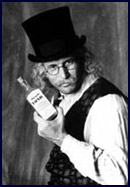
The best way to choose a story is if the story chooses me, as it were. In 1999 I was all set to do an Irish piece I thought I wanted to do. Then I saw a documentary of the 1996 Mt. Everest disaster and I walked out thinking, "I have to write something about this." So I threw out the Irish idea and wrote Chomolungma, a play about a mythic mountain disaster.
I used to choose a story by reading a lot of myths, fables, and folktales, and when one really reached out and grabbed me by the throat I knew, "This is it!" However, at this point in my development I find that this no longer serves me. Having read thousands of myths and folktales from all over the world, it is rare now that I read a story that doesn't sound familiar — or like one I've done. So I am now using different means for inspiration — like looking at paintings and listening to music. But chances are the story will still involve Time, the Past, the Identity, Dreams or Suffering...
You mentioned in an article that you began writing your own scripts as a way to save on the expense of royalties. So while you studied Art and Theater at the university — it seems you came to writing almost by accident. How do you think you have evolved as a playwright over the last decade? Is there a sort of process you go through transforming and reworking the traditional tale into one that has resonance for a contemporary audience?
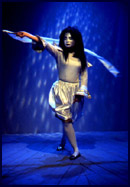
I have always written. In elementary school I wrote a 40–page novella. It was a horror story about a giant bat. And I wrote at least one full–length play in high school. But then I put writing aside to study art and theatre. After graduate school I decided that I knew nothing about writing and wanted to teach myself to write. So I read a lot of good fiction, asked myself why I thought it was good and tried to use those principles in order to do my own writing. I was writing short stories at the time. I spent a year on a single 10–page story. It was very satisfying to be able to work on one really short thing with no deadline.
I started writing plays seriously in 1986, although I did not start to concentrate on myths until four years later. I don't know if there is a development in my plays in terms of quality. That sounds odd to say. There are some early plays that I think are much better than some more recent plays — and visa versa. But I do think that I have relied on text less and less. This is probably because I know that I am going to stage everything I write. I cannot separate the writing from how it will be staged. That may be a detriment to my writing, I don't know. The words don't need to convey everything because I know that the staged action will fill in the blanks. A playwright who is not a director has no such latitude. For him the writing better be crystal clear because someone else has to decide to stage it (or not) based only on the words. Not so for me. I have at least one play that is nothing but stage directions. If I sent that script to another theatre for consideration, I'm guessing that play would very quickly end up in the garbage — because there is still a belief that theatre is chiefly an art form of The Word.
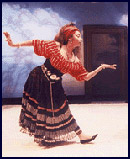
The question of how one speaks to one's own audience is an ongoing question that I think a director asks his entire life. I've seen plays in strange make–up and costumes and languages that have seemed more like home than one set in a New York living room. I like Brecht's charge that the business of theatre was "to make the familiar strange and the strange familiar." I have no interest in being exotic. Even if we are doing a play about life in 14th century Tibet (which we did) I don't want the audience to think, "Isn't that interesting — how they live." I want them to sit there and think, "This story is about me." You need to build a window through which you allow the audience to easily enter your world. Sometimes this window is a character, or a situation or a narrator. I use the narrator a lot because if the audience identifies with him, he can take them anywhere. It is as if he is saying, "What I am about to show you is very bizarre; but if you just stay with me you will see that it will all have meaning for you."
I am also fascinated by your bold experiments with "invented language" in The Cure: A Dramatic Ceremony in One Act and The Medicine Show. Why did you decide that certain works needed this type of language? What sort of considerations go into the creation of these invented languages?

I spent several months in Poland doing theatre research in the early 90s. I was the guest of the largest theatre in Krakow and watched them rehearse a play while I was there. I also saw as much theatre as I could — all over the country. I saw 26 plays in Polish and I neither spoke nor understood any of the language. Based on that experience I became fascinated with how information is communicated on stage if you do not have language to hold onto — as I did not. This is what I set out explore with my language projects.

We wanted the characters to talk in a language that would be foreign to everybody. Creating the language was the easy part. The hard part was to create a theatre piece using this language that would not confound the audience. This kind of work limits what you can do. You can't for example do a play which debates ideas, in the traditional sense — because the audience is left with action and not speech. You might say that action reveals ideas and I would say yes. But the idea revealed exists solely in the mind of the spectator and can never be confirmed. The character in an invented language piece can never reveal his/her own ideas. In this way the audience becomes a playwright as he watches the play — ascribing motives to characters whose action he sees, but whose language he cannot understand.
While most theater productions work under the gun of a relatively short production time, Ziggurat has a unique production schedule that respects a long rehearsal process for each piece it produces. Can you explain a little about what goes on during the rehearsals? What's the usual breakdown of a production schedule like? What sort of impact do you think this slower pace has on the actors? The designers? The final production itself?
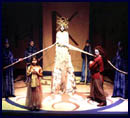
A favorite Grotowski quote is that "all recipes lead to banality." For that reason there is no usual thing we do. But we are a theatre of movement and so, more often than not, an early question is "What is the physical life of the world of this play?" Physicality is for me harder to render than text. Our naturalist tradition in America has not prepared us for scoring physical beats. Our training has been "play the motivation," and leave yourself alone physically — unless you are specifically playing a character with a limp, for example. I find that actors are usually cast because of who they are, not who they can be. The physical work takes a long time to find and longer time to make "natural."
Also because we are always working with new scripts we need the extra time to rework scenes as they are needed. I think everyone is more relaxed with a longer rehearsal period. There is much more time for the play to germinate in the imagination of the actors.
To be honest, I don't know if the designers are helped by the long rehearsal period. They are not hurt by it, but what the designers really need is a long pre–rehearsal period. Our pre–rehearsal period is not as long as it should be.
Can you tell us something about the new play Salamanticus that opened this month at the Miles Playhouse in Santa Monica?
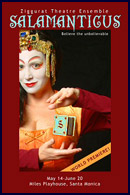
A friend of mine once likened my work to a good cup of coffee — dark and complex. Salamanticus is an attempt to explore my lighter side — if there is such a thing. As a playwright, I am attracted to dark material and it is a challenge for me to do comedy.
Salamanticus is part of that group of myth known as Grail Myths — where a person or persons go off in search of a sacred object. In this play three misfits go off in search of a sacred book — The Salamanticus — because they believe that it will heal their ailing kingdom. It is not based on any previous material, it is pure invention. Years ago, I used to say that all my plays were spiritual and in those days they all had a religious/mystical tone. But I discovered that a lot of things can qualify as spiritual. The life force, the joy of being alive and the elation of performing can be spiritual. This is what comedy can give us. This is what I hope my actors and my audience will share.
Author's Notes
For more information on Ziggurat Theatre Ensemble, a chance to read articles and reviews of their productions, and best of all, book tickets to their remarkable productions, please visit their website.
About the Author
Midori Snyder is an author, educator, and the associate editor of the online journal Endicott Studio For Mythic Arts.

